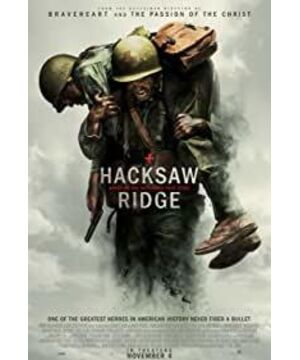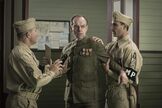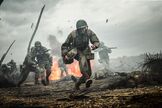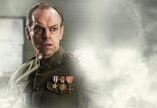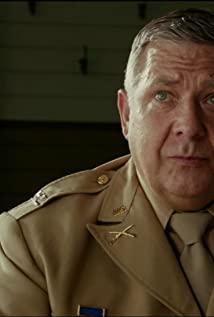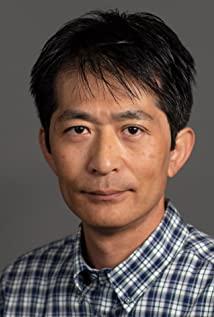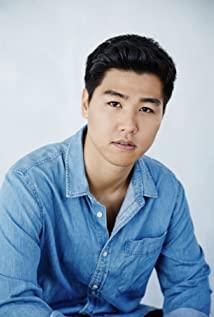WeChat public account / Qi Yan Feiyu
"People must use their lives to explain their beliefs." - Ma Puton
"Blood Battle Hacksaw Ridge", just watching the trailer, I feel very shocked. After watching the movie completely, I only feel that the blood and beliefs are surging in my mind and body. Hold on to your beliefs, don't push your beliefs.
01.
A soldier who is determined not to take guns or kill people and wants to be a military doctor.
When I watched the trailer at the time, I was very surprised by this question, why are there war soldiers who don't use weapons and only save people?
The first indication of this in the film is when Dawes is in a fight with his brother Hal, who nearly kills him. Later, he saw the painting of Cain killing his brother Abel on the wall of his home, especially when he saw the painting about the sixth commandment in the "Ten Commandments" of Christianity: Don't kill, don't kill, he was deeply shocked and felt that No one should deprive others of life under any circumstances.
In the end, it made him firm up his belief that he would not kill without touching a weapon. In the film, Dawes's father wanted to shoot Dawes's mother, and Dawes stepped forward and grabbed the gun. The truth is that Dawes's father almost shot Dawes' uncle to death after getting drunk. At that time, Dawes's mother stepped forward to grab the gun and called the police. This scene left a deep impression on the young Dawes. , he vowed never to touch a gun.
Growing up, he accidentally rescued a young man from a car accident. After being sent to the hospital, the doctor said to him "You may have saved his life", which is different from the previous time when his mother said to him, "You almost killed him." to him”, in stark contrast.
After he met Dorothy, he told her "I've always wanted to be a doctor", and later in the plot, he was seen reading books on anatomy.
02.
After the foreshadowing and the end of the love scene, "I have to go to the army, everyone else." This is Dawes's original words. Even if his fiancée, Dorothy, told him, "But you're no one else," he still planned to join the army.
However, his life in the barracks was not what he expected. He mistakenly joined the rifleman, but refused to carry weapons and participate in rifle training. Even if he passed the other subjects, he was also designated as a "conscientious objector".
His comrades mocked him for being arrogant, insulted him as a coward, crowded and beat him collectively... The superiors ignored and encouraged all this to happen, let him go to the toilet, forbid him to take vacations, planned to drive him away with mental problems, failed He was later brought to court-martial for not obeying the orders of his superiors.
But they had a low point on Dawes. Even if he went to court, he still insisted on his beliefs and finally won.
The cruelty of military training can be imagined, but I think the most terrifying thing is not this, but seeing wounded soldiers.
Dawes and the others encountered a carload of wounded on the way to training. All the wounds you can't imagine, the face was destroyed, the gauze oozing blood, multiple gunshot wounds, incomplete limbs... The
wounded were only lifeless . eyes through which you can only see killing and blood.
The wounded are only left with a mutilated body, and you can't see the original soul in that body at all.
03.
When the film is played for about an hour and ten, it begins to officially enter the battlefield.
You can see how brave those cowards are on the battlefield, how scared the big guys are, how low life can be... All the ugly side of human nature can be exposed on the battlefield. , all we can see is that they are using all means to take each other's life.
This is the most ferocious, cruel, bloody, real and long war scene I have ever seen. In the life-and-death charge battle, one second is still speaking lines, and the next second, his head is pierced. Bullets, explosives, flames, and bayonets tore the bodies of both sides back and forth, screaming and roaring one after another, life was quickly and mercilessly deprived here, the smell of blood filled the air, blood and mud could not be distinguished clearly, everyone They all tried their best to kill people with blood and blood.
Only him, thinking about saving people. Even knowing that killing is the essence of war. He always insisted on his beliefs, "When everyone is killing people, I want to save people. I want to join the army, I want to take care of you as a medic, and I want to go to the battlefield."
The deepest impression is that when the army decided to retreat, Dawes saw the hell scene on the battlefield. He collapsed and confused, and began to ask: "What do you mean by letting me see this?! What do you want me to do?"
Then, at that moment, he heard the wounded shouting "medics" on the battlefield, and finally understood his mission, and made the decision to refuse to retreat, intending to return to the battlefield to save those injured and unable to Retreat wounded.
In the long dark night filled with the breath of despair, he crawled alone on the battlefield full of corpses, distinguishing and turning the bloody bodies, running back and forth to rescue the still breathing wounded soldiers, and after giving them simple treatment, The wounded were dragged to the edge of the cliff, and finally roped and lowered to the bottom of the cliff.
When he couldn't hold it, he begged "God, please, let me save another one" again and again, until his hands were bloody and exhausted. For a full 12 hours, Dawes shuttled through the hail of bullets on the battlefield with his bare hands, saving 75 wounded.
04.
In the film, the film ends after Dawes is carried away on a stretcher.
However, in reality seventy years ago, Dawes rolled off the stretcher on his way down because he found another wounded man, he wanted to give the stretcher to his comrades, and then walked back to the first aid station by himself, At that time, there were at least seventeen pieces of shrapnel on his leg, and he was shot by a Japanese sniper on the way. After that, Dawes was awarded the Congressional Medal of Honor and the War Wounded Medal, and was received by President Kennedy, and then basically faded out of the public eye.
But his life was not easy: he was seriously injured and contracted tuberculosis, which made his physical condition worsened by multiple injuries, and was identified as 90% disabled by the time he was discharged. He was in treatment for nearly 5 and a half years and lost his ability to work. Completely deaf since 1976. He received cochlear implant surgery in 1988 to restore hearing.
I remember when Dawes was in prison:
his superiors came to see him in prison, and he said, "My values are also being destroyed. The world is falling apart, and I want to piece it together little by little."
His fiancée came too Persuading him, he said, "If I can't hold on to my beliefs, I don't know how to live, and I don't know how to spend the rest of my life with you."
We have always known that "alternatives" are not easy to survive, and even most of them will die, which is why they are more valuable. When they shine and become legends, we inevitably have a kind of respect and encouragement. Dawes finally came off the cliff, trembling and trembling, finally showing vulnerability as they tried to appease him.
So, even though I knew that the film was very personal, I insisted on watching it in theaters.
We all know that the most powerful weapon in the world is not guns, but faith. When the whole world does not understand you, can you always stick to and practice that belief? He did it, the real hero, he is different from the movie, he is more legendary than the movie.
During the war, in the purgatory on earth, he always insisted, in the fire of artillery, with his bare hands, without hurting one person, he has been saving thousands of people, and I will go. I was shocked.
"I'm not pretending to be like everyone else, I'm who I am. I'm just sticking to my beliefs.
I hope, I can too.
View more about Hacksaw Ridge reviews


